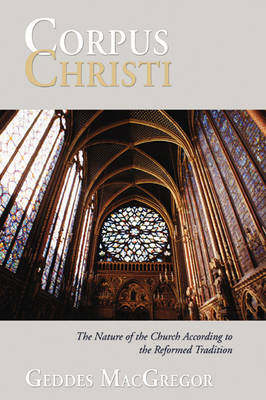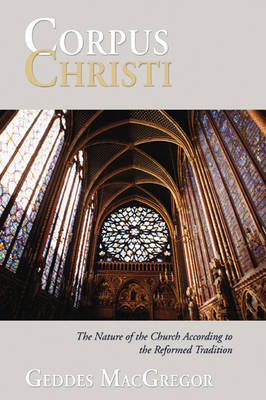
- Retrait gratuit dans votre magasin Club
- 7.000.000 titres dans notre catalogue
- Payer en toute sécurité
- Toujours un magasin près de chez vous
- Retrait gratuit dans votre magasin Club
- 7.000.0000 titres dans notre catalogue
- Payer en toute sécurité
- Toujours un magasin près de chez vous
Corpus Christi
The Nature of the Church According to the Reformed Tradition
Geddes MacGregor
Livre broché | Anglais
51,95 €
+ 103 points
Description
Christians do not always mean the same thing when they speak of the Church. What is held about the nature of the Church is of great importance because it is intimately connected with what is held about the nature of Christ. The purpose of this book is to present the Reformed tradition on the subject. At the outset, the author gives a brief sketch of the four main traditions within the Reformation heritage: Lutheran, Anglican, that of the Separatists, and the Reformed. The study includes an examination of the medieval background, an exposition of Calvin's doctrine of the Church, and an extended account of the development of thought on the subject in the Church of Scotland, with special reference to the contributions of the Scottish divines of the seventeenth century. Dr. MacGregor analyzes the Greek term 'ekklesia', and then presents the doctrine of Baptism as meaning incorporation by the Holy Spirit into the Body of Christ. He also deals extensively with the subject of the Eucharist, as well as the development of the corporate episcopate in the Reformed Church. The doctrine of the ministry is expounded and some controversial questions considered, including questions about the nature of the eldership. The final chapter reviews the whole conception of the Church as the Body of Christ. MacGregor concludes that the Reformed doctrine of the Church is based soundly on Scripture and the classic definitions of the Person of Christ, and that the only ground for unity in the Church is Christ himself. The Church exists where the Word is preached and the Sacraments are celebrated, and where it calls men to discipline and to service. Scholarly footnotes are given on almost every page, and two appendices are provided. One contains passages, in Latin, illustrating the teaching of St. Augustine on Christ as the Head and the Church as the Body. The other contains extracts, in Latin, French, and English, from ten confessional documents, beginning with the Augsburg Confession (1530) and extending to the Westminster Confession (1647). There is also an extended bibliography and a topical index. This book is an excellent resource for ministers, teachers, and students alike.
Spécifications
Parties prenantes
- Auteur(s) :
- Editeur:
Contenu
- Nombre de pages :
- 306
- Langue:
- Anglais
Caractéristiques
- EAN:
- 9781592447060
- Date de parution :
- 19-05-04
- Format:
- Livre broché
- Format numérique:
- Trade paperback (VS)
- Dimensions :
- 143 mm x 215 mm
- Poids :
- 371 g

Les avis
Nous publions uniquement les avis qui respectent les conditions requises. Consultez nos conditions pour les avis.






